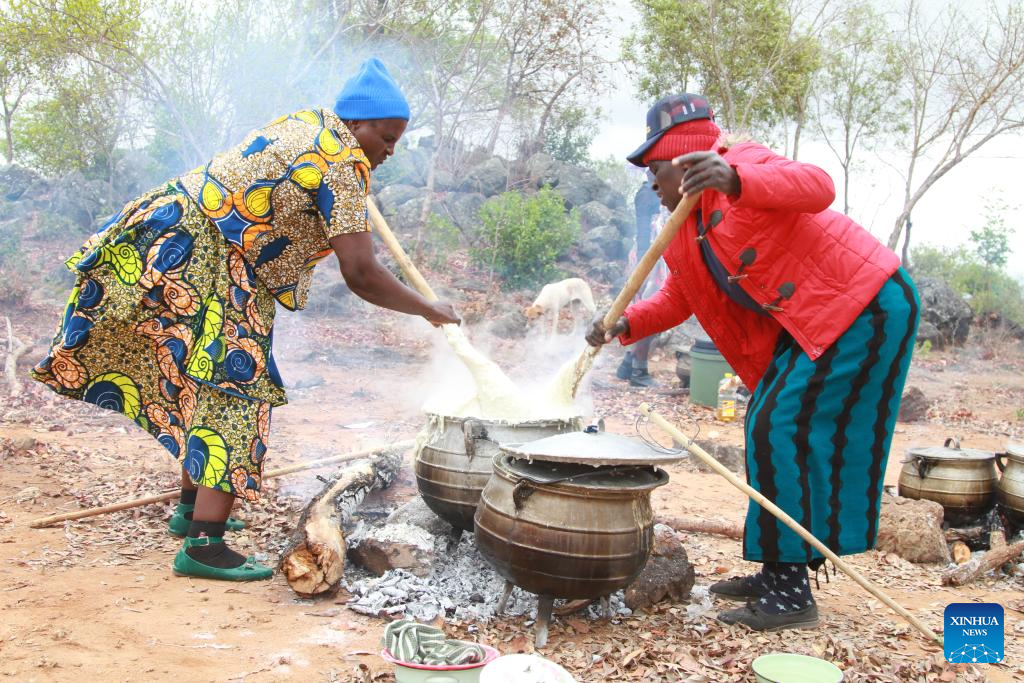
Women prepare a traditional Zimbabwean meal in Shashe, Masvingo Province, Zimbabwe, on Oct. 16, 2024.(Photo by Tafara Mugwara/Xinhua)
HARARE, Oct. 21 (Xinhua) -- As Zimbabwe grapples with a drought that has been declared a state of disaster, traditional grains such as sorghum and millet are providing a sustainable solution to food insecurity.
Unlike the main staple maize, which needs lots of water to thrive, traditional grains are tropically adapted crops due to their structural characteristics.
"They just grow like grass," said Diana Sedze, a small-scale farmer from Nyanga District in Manicaland Province. "If you grow traditional grains, you are guaranteed a harvest."
Sedze said growing traditional grains and consuming traditional foods is in line with food sovereignty, a concept that allows communities to control the way their food is produced, consumed, and traded.
Sedze is a member of the Zimbabwe Smallholder Organic Farmers Forum (ZIMSOFF), an organization that envisions improved livelihoods of organized and empowered smallholder farmers practicing sustainable and ecological agriculture.
She joined other farmers recently to mark World Food Day at an event organized by ZIMSOFF at Shashe Agroecology School in Masvingo Province. The school aims to empower local farmers by promoting the exchange of experiences and disseminating agroecological and sustainable agriculture practices.
Traditional grains were grown in Zimbabwe for generations, but maize became the preferred cereal as colonization influenced and disrupted conventional agricultural practices. Despite being drought-resistant, traditional grains are often allocated a small portion of land and are not given the same value as maize by many Zimbabwean farmers.
As rainfall patterns become increasingly unpredictable, maize yields are declining. The bulk of the 2023/2024 rain-fed maize crop was declared a complete write-off due to an El Nino-induced drought, leaving more than 60 percent of Zimbabwe's population food insecure.
A shift to locally adapted traditional grains is now in motion, helping smallholder farmers ensure the constant availability of food.
In Zimbabwe, traditional grains are ground into flour, which is used to cook a thick porridge known in the Shona language as Sadza. Sadza, the primary source of starch, holds cultural significance to the local cuisine and is served with meat and green vegetables.
"In addition to their nutritional value, traditional grains are cheap to produce. For example, crops like sorghum and millet do not require supplementary fertilizers. We just cultivate them using manure, so it's cost-effective," said Sedze.
Even health professionals encourage people to eat traditional grains due to their nutritional value. "I am a cancer survivor, and I was recommended to eat traditional grains because they are more nutritious," she added.
The production of traditional grains is in line with the Zimbabwean government's goal of achieving food and nutrition security at the household level. Farmers in regions with below-average rainfall are encouraged to grow traditional grains because of their drought tolerance.
Statistics show that the hectarage put under sorghum increased by 27 percent in the 2023/2024 season from the previous season, and that of pearl millet increased by 7.5 percent.
Janet Simbini, a farmer from Checheche in Manicaland Province, said people are beginning to notice the benefits of traditional grains.
"They take less time to mature. This shields us from vulnerabilities," Simbini said. "A lot of people are coming to inquire about traditional grains because they are witnessing their resilience."
Simbini follows agroecological food production practices that rely on sustainably utilizing resources readily available on the farm, such as the use of manure. This protects the environment and makes farming more resilient, she said.
Elizabeth Mpofu, a farmer from Shashe and a member of ZIMSOFF, emphasized the importance of food sovereignty.
"The issue of sovereignty is very important. We want to have control over our food, how it's grown, and its distribution using the locally available resources," she said.
The Zimbabwean government is also pushing for the adoption of traditional food systems.
"As a nation, we have an identity. We have the food that defines us as a people of Zimbabwe," Masvingo District Development Coordinator Kenneth Madziva told Xinhua in a recent interview, adding that the type of food that is consumed should be determined by the locals.
"We don't want a situation whereby you go to a market and buy something because that's what is there. We are saying we need our locally produced food," he said. ■
